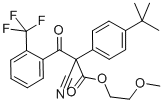Chemical Properties
Cyflumetofen is an acracide and insecticide. It has a low aqueous solubility and is non-toxic. It tends not to be persistent in the environment. Whilst its toxicity to honeybees is low it t has a moderate to high toxicity to most other biodiversity. Its oral mammalian toxicity is low.
Uses
Cyflumetofen is a novel acaricide that only affects spider mites.
Definition
ChEBI: 2-methoxyethyl 2-(4-tert-butylphenyl)-2-cyano-3-oxo-3-[2-(trifluoromethyl)phenyl]propanoate is a nitrile that is acetonitrile in which the methyl hydrogens have been replaced by o-trifluoromethylbenzoyl, p-tert-butylphenyl, and (2-methoxyethoxy)carbonyl groups. It is a nitrile, a beta-ketoester, a member of (trifluoromethyl)benzenes and a 2-methoxyethyl ester.
Biological Activity
It has been shown to inhibit the activity of detoxification enzymes and mitochondrial membrane potential, which may be responsible for its toxicity in insects. Cyflumetofen also causes a synergic effect with other chemicals, such as pesticides, by increasing their toxicity to insects.
Mechanism of action
cyflumetofen inhibited mitochondria complex II in mites. In addition, the de-esterified form (AB-1) of cyflumetofen inhibited mitochondria complex II at extremely low concentrations. AB-1 was also detected as the main metabolite in mites. The mode of action of cyflumetofen is to inhibit mitochondria complex II by affecting its action site after being metabolised to AB-1. However, inhibition by cyflumetofen and AB-1 in other organisms was very weak. Selectivity for other organisms has contributed to differences in action site activities.





